Men do not stop ejaculating at a fixed age. Ejaculation continues into older age, although frequency, volume, and force often decline. A study in European Urology reports that about 60% of men over 65 notice weaker or less frequent ejaculation. Total loss usually occurs only after medical conditions or treatments, such as prostate surgery, diabetes, or neurological illness. Testosterone decline with age reduces desire and may affect function, but it rarely stops ejaculation completely. This means age alone does not end ejaculation, though aging makes it more vulnerable to health-related changes.
What Is Ejaculation?
Ejaculation is the release of semen from the male reproductive tract during sexual climax, and it is essential for natural reproduction. Ejaculation occurs in two coordinated phases: emission and expulsion. In the emission phase, seminal fluids from the prostate, seminal vesicles, and vas deferens mix with spermatozoa in the urethra, while the bladder neck closes to prevent retrograde flow. In the expulsion phase, rhythmic contractions of pelvic muscles such as the bulbospongiosus propel semen out of the urethra. This process is regulated by sympathetic and somatic nervous system pathways and coordinated by the spinal generator of ejaculation located in the lumbar spinal cord.
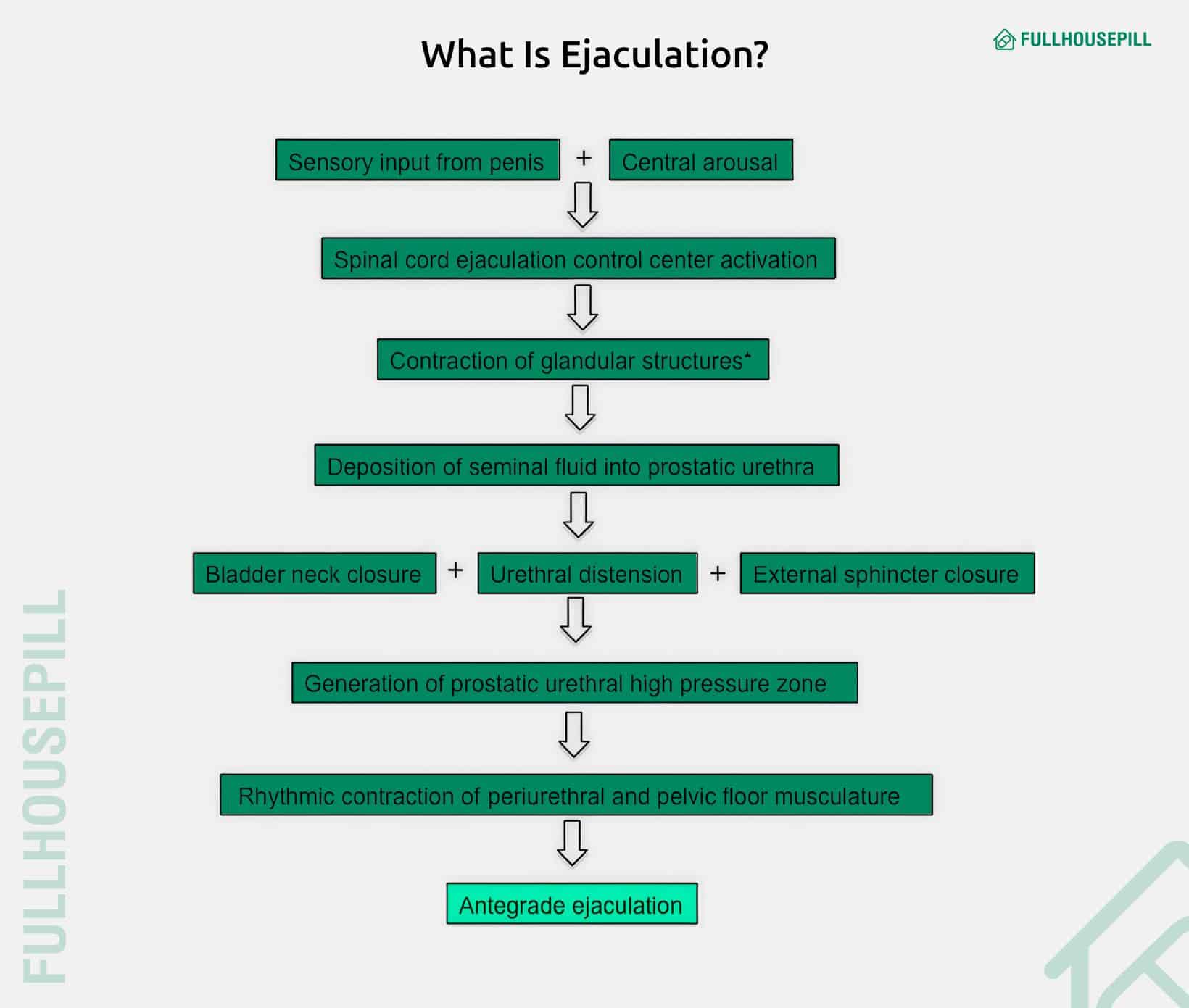
Hormones and neurotransmitters also influence ejaculation. Dopamine facilitates the reflex, serotonin often delays it, and oxytocin rises after ejaculation to enhance sperm motility. Testosterone plays a central role in maintaining ejaculatory control, with low levels linked to delayed ejaculation and high levels sometimes associated with premature ejaculation.
Ejaculation usually begins at puberty, a stage known as ejacularche. According to a research article published in the “Translational Andrology and Urology”, the average reported age for the onset of puberty is 12.39 years, while that of first ejaculation is 13.59 years. It may happen during nocturnal emissions, commonly called “wet dreams,” or through masturbation. This developmental milestone marks the onset of reproductive capacity and is often compared to menarche in females.
Is There A Specific Age When Men Stop Ejaculating?
There is no specific age when men universally stop ejaculating. Research consistently shows that ejaculation continues from puberty into advanced old age, though changes in frequency and volume occur gradually rather than abruptly. This gradual change is highlighted in a Journal of Andrology study, which reported that semen volume and sperm motility decline with age. Instead of stopping completely, older men often notice reduced force and smaller ejaculate quantity.
The pattern becomes clearer when looking at population-level data. A community-based study from the Netherlands found that ejaculatory dysfunction increased from 3% in men aged 50–54 years to 35% in those aged 70–78 years. Even then, the study emphasized that complete cessation is rare, with dysfunction usually linked to comorbid health conditions rather than age itself.
This link between aging, health, and sexual function was further confirmed by the European Male Ageing Study (EMAS). Analyzing 3,369 men aged 40–79, the study found that about 6% experienced severe orgasmic impairment. The likelihood of impairment rose with age and medical conditions, yet no specific age was identified at which ejaculation stops altogether.
Underlying biological changes add further context. Research documents that semen volume, sperm quality, testicular size, and hormone levels all decline with age. For example, daily sperm production drops by more than 30% in men over 50. Still, these changes reflect reduction rather than complete loss. Together, these findings show that ejaculation does not end at a fixed age. Instead, it persists across the lifespan, shaped more by overall health and age-related decline than by a universal biological cutoff.
How Does Aging Affect Ejaculation?
Aging leads to measurable declines in semen volume, sperm motility, normal morphology, ejaculatory sensitivity, and force, accompanied by longer recovery periods and increased sperm DNA fragmentation. These changes often begin as early as age 30–35, become more pronounced after 50, and reflect a gradual decline rather than complete cessation, which usually occurs only in the presence of significant health conditions.
According to a 2019 systematic review and meta-analysis in Endocrine Reviews, advancing age is linked to small to moderate declines in semen volume, total sperm count per ejaculate, percentage motility, progressive motility, and normal morphology, while sperm concentration itself does not significantly decrease. The review emphasized that the most prominent changes are decreased progressive motility and increased sperm DNA fragmentation, with declines often beginning between ages 30–35.
These early declines continue into later decades. A study published in PMC reported that daily sperm production decreases by more than 30% in men over age 50. The same study found measurable annual reductions in semen volume and sperm motility, alongside a decline in normal sperm morphology after age 40. Both total sperm count and motility showed a negative correlation with advancing age. Research published in ScienceDirect comparing men in their 30s with men in their 50s confirmed this trend, documenting declines in semen volume (3%–22%), sperm motility (3%–37%), and normal morphology (4%–18%).
Further confirmation comes from a 2020 study in PMC, which showed that men above age 50 were significantly more likely to have lower semen volumes, total sperm counts, sperm concentration, and impaired progressive motility compared to men aged 21–30. In that study, sperm motility specifically declined by 3–16% across two decades.
Beyond semen parameters, ejaculatory experience itself also changes. The MSD Manual highlights a decline in fluid volume released during ejaculation, reduced penile sensitivity, and prolonged refractory periods with aging. It also notes that some men may experience orgasm without ejaculation and diminished forewarning before climax. These functional changes occur alongside anatomical and hormonal shifts: testicular volume declines after age 60, and lower testosterone contributes to weaker libido, slower response times, and altered ejaculatory patterns.
What Are The Different Types Of Ejaculatory Dysfunction In Aging Men?
Below is a list of Ejaculatory dysfunction present in aging men.
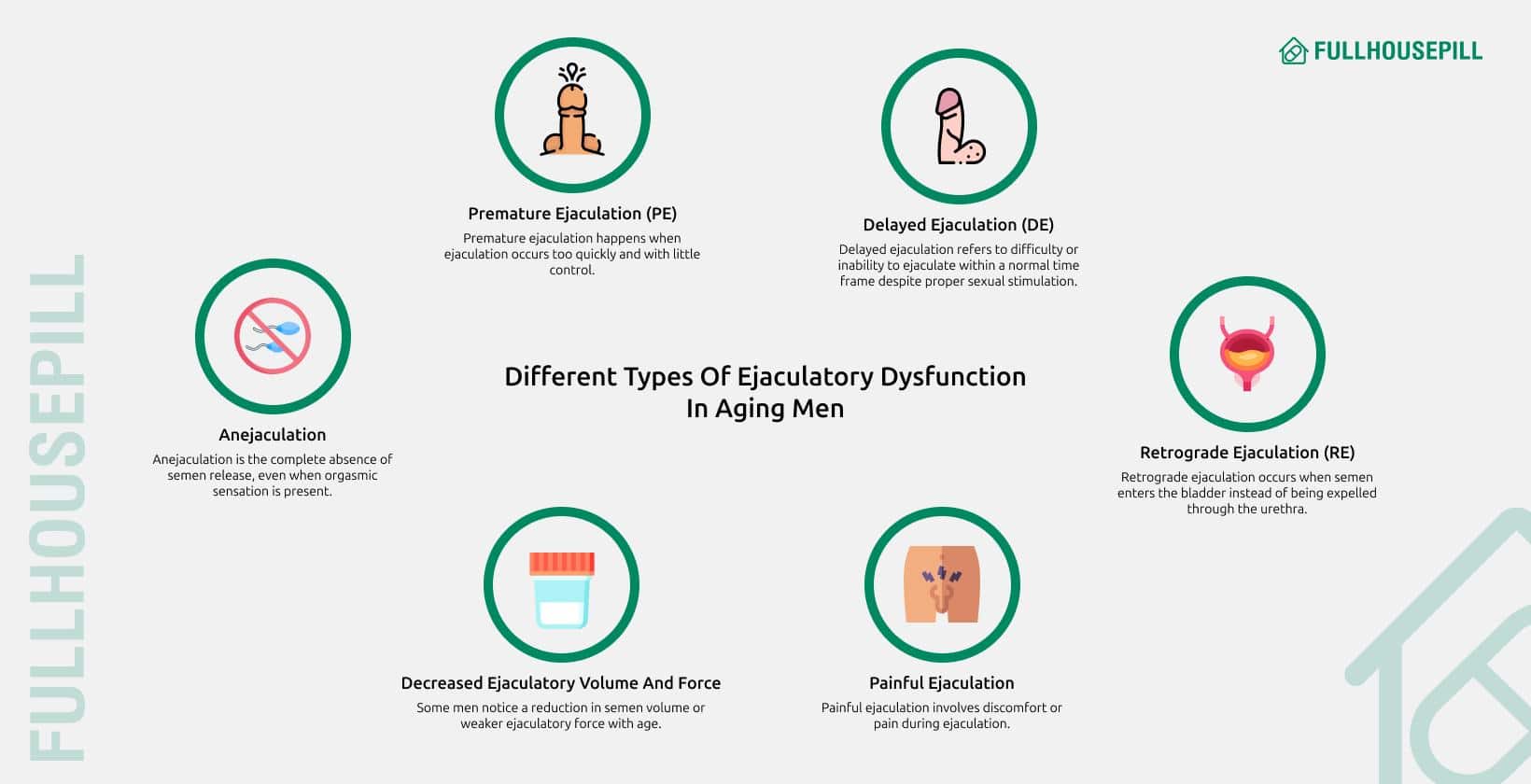
- Premature Ejaculation (PE)
Premature ejaculation happens when ejaculation occurs too quickly and with little control. It is the most common ejaculatory disorder across all age groups. According to a review in Current Concepts in Ejaculatory Dysfunction (PMC), premature ejaculation remains common in older men, even though other dysfunctions increase with age. - Delayed Ejaculation (DE)
Delayed ejaculation refers to difficulty or inability to ejaculate within a normal time frame despite proper sexual stimulation. Research in European Urology and PMC shows that delayed ejaculation becomes more common in older men due to reduced nerve sensitivity, chronic illnesses, and medication use. - Retrograde Ejaculation (RE)
Retrograde ejaculation occurs when semen enters the bladder instead of being expelled through the urethra. A review in PMC reports that this condition is often caused by prostate surgeries, such as prostatectomy, or medications like alpha-blockers used for benign prostatic hyperplasia (BPH). - Anejaculation
Anejaculation is the complete absence of semen release, even when orgasmic sensation is present. The Multinational Survey of the Aging Male (2003) found that anejaculation increases with age, particularly in men with neurological problems or prostate disease. - Painful Ejaculation
Painful ejaculation involves discomfort or pain during ejaculation. The EAU Guidelines on Sexual and Reproductive Health identify this as a growing issue in older men, often linked to prostate inflammation, lower urinary tract problems, or past surgeries. - Decreased Ejaculatory Volume and Force
Some men notice a reduction in semen volume or weaker ejaculatory force with age. Findings from the study titled, “Erectile and ejaculatory dysfunction in a community-based sample of men 50 to 78 years old: prevalence, concern, and relation to sexual activity”, show that reduced semen output affects around 3% of men in their early fifties but rises to about 35% in men aged 70–78.
| Type | Description | Comments |
| Premature Ejaculation | Uncontrollable, early ejaculation | Most common overall |
| Delayed Ejaculation | Prolonged latency to ejaculation | Increases with age |
| Retrograde Ejaculation | Semen enters bladder, not urethra | Often after surgery |
| Anejaculation | Absence of ejaculation | Associated with comorbidities |
| Painful Ejaculation | Pain/discomfort during ejaculation | Linked to urinary issues |
| Decreased Volume/Force | Lower semen amount/ejaculatory force | Age and illness related |
What Medical Conditions Can Cause Loss Of Ejaculation?
Loss of ejaculation can occur due to surgery, chronic illness, medication side effects, or psychological factors. Each condition disrupts the nerves, hormones, or physical structures needed for normal ejaculation.
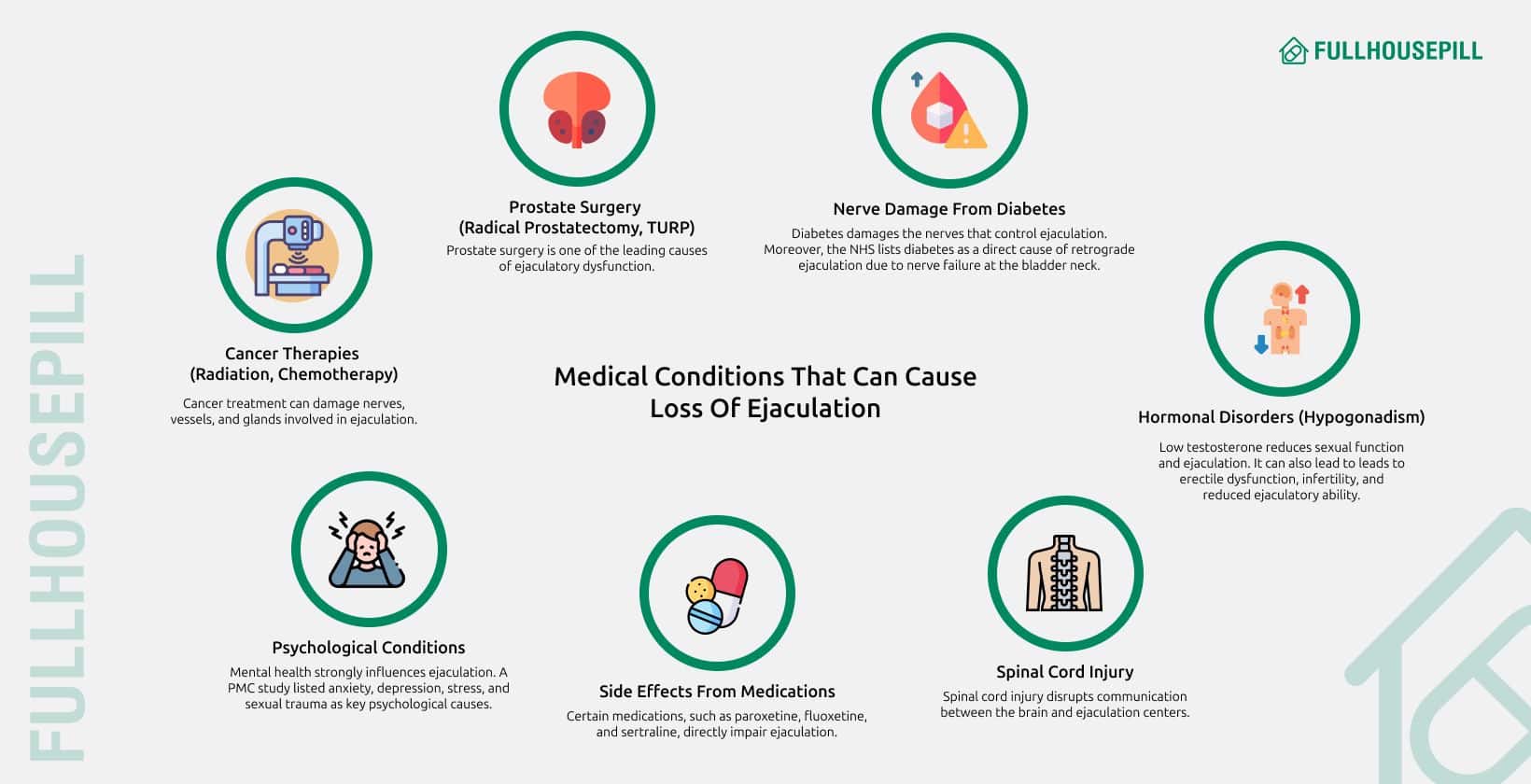
- Prostate Surgery (Radical Prostatectomy, TURP)
Prostate surgery is one of the leading causes of ejaculatory dysfunction. A review in Liebertpub reported that traditional TURP preserved normal ejaculation in only 20% of men, while newer techniques achieved rates over 90%. Another 2020 PMC meta-analysis showed that most men experience retrograde ejaculation after prostatectomy due to damage to the bladder neck muscles.
- Nerve Damage from Diabetes
Diabetes damages the nerves that control ejaculation. A 2021 PMC study estimated that 5%–18% of young men with type 1 diabetes develop ejaculatory dysfunction from diabetic neuropathy. Animal studies in PMC showed diabetic rats developed degeneration in sympathetic nerves, causing delayed or absent ejaculation. Moreover, the NHS lists diabetes as a direct cause of retrograde ejaculation due to nerve failure at the bladder neck.
- Spinal Cord Injury
Spinal cord injury disrupts communication between the brain and ejaculation centers. A Human Update review found that only 11.8% of men with complete spinal cord injury could ejaculate through masturbation. Penile vibratory stimulation and drug therapy improved success rates, but complete lesions at T12–S5 eliminated ejaculation. A long-term PMC study reported 86% ejaculation success in men with injuries at T10 or higher, compared to only 15% at T11 or lower.
- Hormonal Disorders (Hypogonadism)
Low testosterone reduces sexual function and ejaculation. Basic and Clinical Andrology research showed men with hypogonadism had significantly lower sexual function scores. A Nature study confirmed that testosterone deficiency is linked to erectile dysfunction and ejaculatory issues through hormonal imbalance. Furthermore, hypogonadism leads to erectile dysfunction, infertility, and reduced ejaculatory ability.
- Side Effects from Medications
Certain medications, such as paroxetine, fluoxetine, and sertraline, directly impair ejaculation. A Psychiatry-Psychopharmacology study found that 61.22% of patients taking SSRIs developed ejaculation problems. A PMC study reported that 67% of men taking sertraline had ejaculatory difficulty, compared to only 19% on nefazodone. A Vascular Health and Risk Management review noted that antihypertensive drugs increase rates of sexual dysfunction compared to untreated men.
- Cancer Therapies (Radiation, Chemotherapy)
Cancer treatment can damage nerves, vessels, and glands involved in ejaculation. A 2020 PMC review reported ejaculatory disorders in 2%–56% of men after radiotherapy. Frontiers in Oncology research linked high-dose penile bulb radiation to increased erectile and ejaculatory dysfunction. A Urological Association Journal review found polychemotherapy reduces libido, erections, and ejaculatory function.
- Psychological Conditions
Mental health strongly influences ejaculation. A PMC study listed anxiety, depression, stress, and sexual trauma as key psychological causes. A Nature article on delayed orgasm confirmed psychogenic factors like fear, relationship conflict, and repressive sexual beliefs as triggers.
Can Medications Cause Weak Or Absent Ejaculation?
Yes, many medications can cause weak or absent ejaculation. Clinical studies show clear links between drug classes and ejaculatory dysfunction.
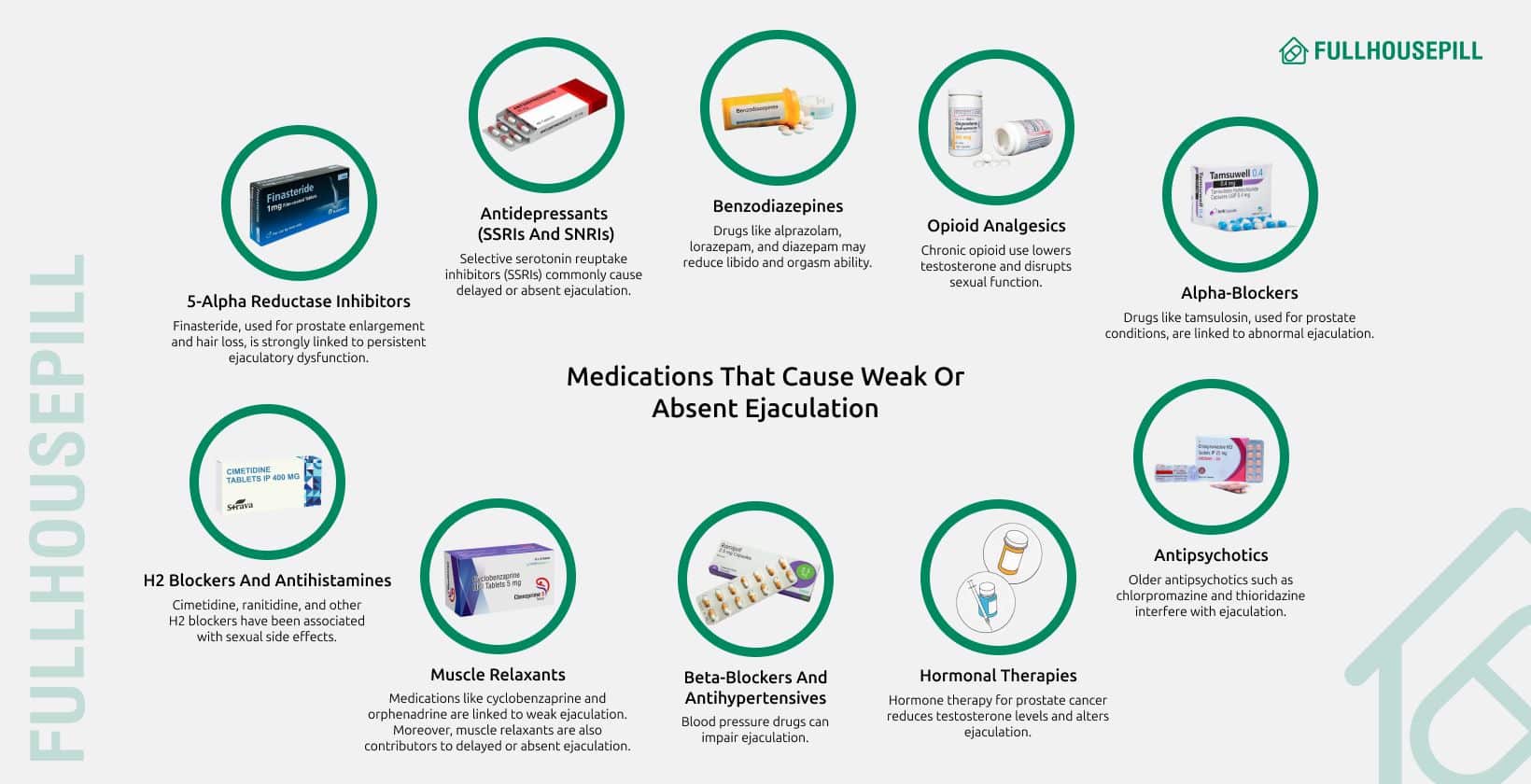
- Antidepressants (SSRIs and SNRIs)
Selective serotonin reuptake inhibitors (SSRIs) commonly cause delayed or absent ejaculation. A review in Psychiatry and Psychopharmacology reported that 61.22% of SSRI users developed ejaculation disorders, while overall sexual dysfunction rates reached 77.55%. Paroxetine, sertraline, and fluoxetine showed the highest risk.
- Opioid Analgesics
Chronic opioid use lowers testosterone and disrupts sexual function. The BMJ reported that long-term opioid use for back pain increases the risk of erectile and ejaculatory dysfunction. The FDA (2016) warned that opioids may cause reduced libido, impotence, and infertility.
- Alpha-Blockers
Drugs like tamsulosin, used for prostate conditions, are linked to abnormal ejaculation. A meta-analysis in Archivio Italiano di Urologia e Andrologia found higher odds of ejaculatory disorders with uroselective alpha-blockers. One study published in Translational Andrology and Urology, 2017, reported anejaculation in 35% of men on tamsulosin, compared to none with alfuzosin or placebo.
- Antipsychotics
Older antipsychotics such as chlorpromazine and thioridazine interfere with ejaculation. A 2025 Nature study identified olanzapine among the top 10 drugs most associated with drug-induced erectile and ejaculatory dysfunction.
- Hormonal Therapies
Hormone therapy for prostate cancer reduces testosterone levels and alters ejaculation. Cancer Research UK notes that patients often report reduced semen volume and less intense orgasms.
- Beta-Blockers and Antihypertensives
Blood pressure drugs can impair ejaculation. A study in the American Journal of Hypertension reported erectile and ejaculatory complaints in 13.5% of patients taking carvedilol, compared with 0.9% on valsartan.
- Muscle Relaxants
Medications like cyclobenzaprine and orphenadrine are linked to weak ejaculation. Moreover, muscle relaxants are also contributors to delayed or absent ejaculation.
- H2 Blockers and Antihistamines
Cimetidine, ranitidine, and other H2 blockers have been associated with sexual side effects. Antihistamines may disrupt hormone production in the testes, affecting ejaculation.
- 5-Alpha Reductase Inhibitors
Finasteride, used for prostate enlargement and hair loss, is strongly linked to persistent ejaculatory dysfunction. A 2025 Nature study reported 961 cases (16.72%) of drug-induced erectile and ejaculatory dysfunction tied to finasteride.
- Benzodiazepines
Drugs like alprazolam, lorazepam, and diazepam may reduce libido and orgasm ability.
What Are The Lifestyle Factors That Affect Ejaculation?
Lifestyle choices directly affect male sexual function, including timing, strength, and control of ejaculation. Research shows that modifiable habits influence sexual health through vascular, hormonal, psychological, and neurological pathways.
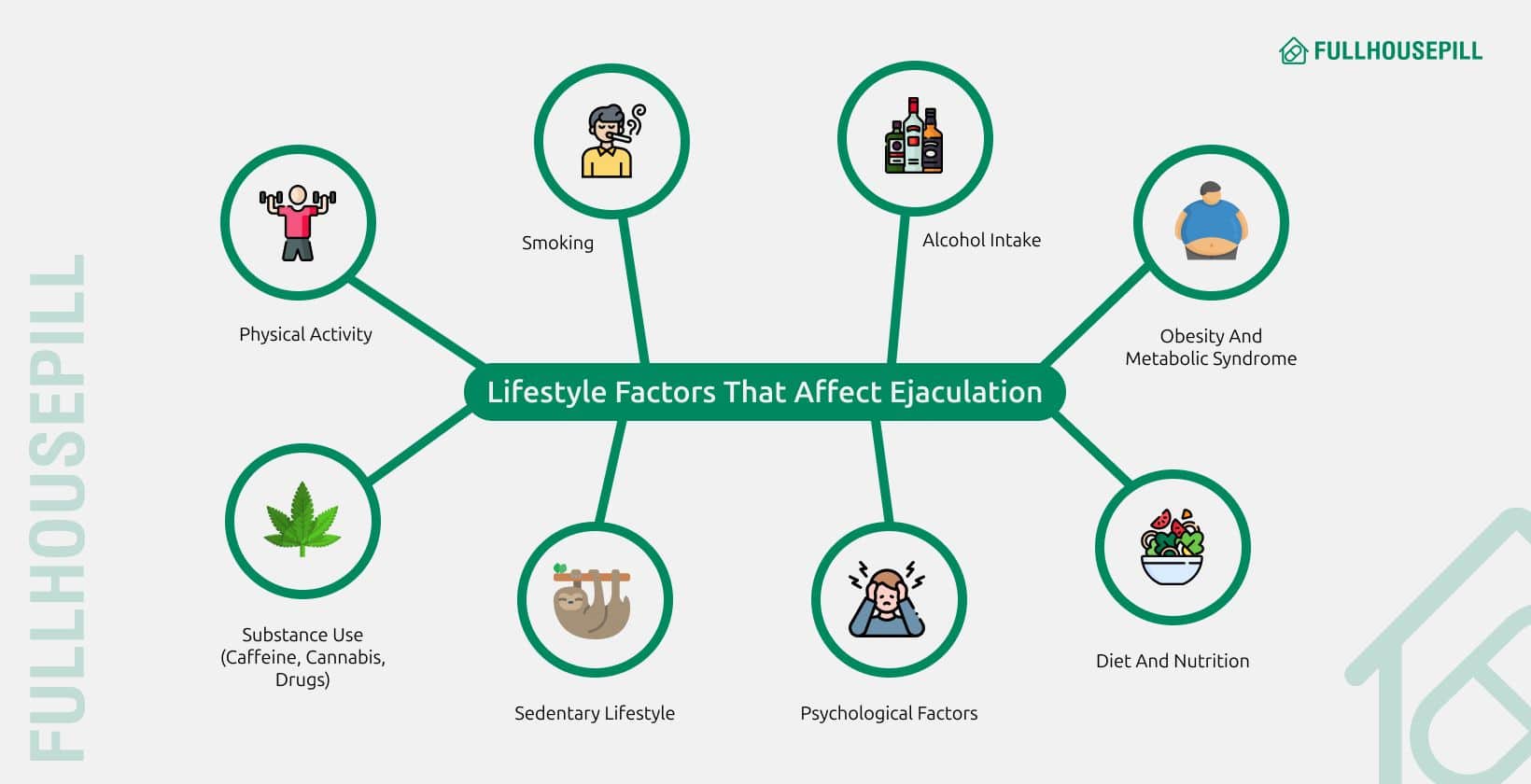
- Physical Activity
Exercise supports ejaculatory control by improving vascular health, hormone regulation, and psychological well-being. A 2023 systematic review, published in PMC, showed that yoga, running, and high-intensity interval training provided improvements in premature ejaculation comparable to drug therapies. Earlier PMC research in 2018 confirmed that physically active men had longer intravaginal ejaculatory latency time than sedentary men. Pelvic floor therapy and Kegel exercises further enhance muscular control, reinforcing the benefits of movement for long-term sexual function.
- Smoking
Where physical activity strengthens sexual response, smoking undermines it. Cigarette smoking is a dose-dependent risk factor for both premature ejaculation and erectile dysfunction, as highlighted in a 2018 PMC meta-analysis. By damaging blood vessels and disrupting nitric oxide pathways, smoking compromises genital blood flow, making ejaculatory control more difficult.
- Alcohol Intake
Like smoking, alcohol affects vascular and neurological pathways, though its impact depends on quantity. The same 2018 meta-analysis found that excessive drinking increased the risk of premature ejaculation and erectile dysfunction, while moderate intake had a limited protective effect for erectile dysfunction only. Chronic heavy use, however, disrupts hormone balance and nerve function, creating long-term impairments.
- Obesity and Metabolic Syndrome
Obesity, abdominal fat, and metabolic syndrome are strongly tied to sexual dysfunction. They promote a pro-inflammatory state. They decrease testosterone levels and impair vascular function. Collectively, these effects reduce the quality of erection and ejaculation. These factors also reduce nitric oxide bioavailability critical for sexual arousal and response.
- Diet and Nutrition
Weight-related risks are closely linked to diet. Nutritional choices influence semen quality and overall ejaculatory health. Diets rich in fruits, vegetables, nuts, fish, and whole grains improve sperm parameters, while Western-style diets high in red meat, sugar, and processed foods reduce semen quality. Nutrients such as selenium, zinc, and omega-3 fatty acids further support sperm health. The Mediterranean diet, by contrast, is strongly associated with improved sexual function.
- Psychological Factors
While diet shapes physical health, mental health exerts equally powerful effects on ejaculation. Stress, low self-esteem, and performance anxiety predict premature ejaculation more strongly than many lifestyle variables, according to a 2017 study published in the International Journal of Research in Medical Sciences. Chronic anxiety and depression also disrupt arousal and orgasmic function, leading to both premature and delayed ejaculation.
- Substance Use (Caffeine, Cannabis, Drugs)
Mental health challenges often intersect with substance use. A study titled, Health-Related Lifestyle Factors and Sexual Dysfunction, suggests that caffeine does not significantly affect erectile or ejaculatory function, while data on cannabis remain inconclusive. However, recreational drug use overall is consistently linked to higher rates of ejaculatory problems and sexual dysfunction.
- Sedentary Lifestyle
Substance misuse often coincides with inactivity, which further weakens sexual health. Sedentary men experience higher rates of premature ejaculation and erectile dysfunction, while regular activity enhances testosterone, vascular health, and psychological resilience. This closes the cycle where physical, psychological, and lifestyle behaviors all converge to determine ejaculatory function.
How Can Men Prevent Age-Related Declines In Ejaculatory Function?
Men can prevent age-related declines in ejaculatory function by following healthy habits and addressing medical concerns early. A balanced approach that combines lifestyle changes, physical exercises, and medical guidance helps protect sexual function over time.
- Exercise regularly: Staying active improves blood flow and supports overall sexual health.
- Eat a balanced diet: Diets rich in fruits, vegetables, and whole grains help maintain energy and reduce risks linked to sexual decline.
- Maintain a healthy weight: Preventing obesity lowers the chance of erectile and ejaculatory problems.
- Quit smoking and limit alcohol: Both habits damage vascular health and speed up sexual decline.
- Manage chronic conditions: Control of diabetes, high blood pressure, and heart disease helps preserve sexual function.
- Strengthen pelvic floor muscles: Kegel exercises improve ejaculatory control and endurance.
- Stay sexually active: Regular activity helps maintain natural response and function.
- Consult a doctor: Medical advice ensures safe treatment options and addresses concerns about age and ejaculatory function.
At What Age Does a Man Stop Getting Hard?
There is no fixed age when a man stops getting erections. Erectile dysfunction can occur at any stage of life, although it becomes more common as men grow older. Age and erectile dysfunction are closely linked, yet aging alone does not guarantee the loss of sexual function. Many men continue to have strong erections and remain sexually active well into their later years. The chances of experiencing ED often increase when health conditions such as diabetes, heart disease, or obesity are present. Lifestyle choices like smoking, lack of exercise, and high stress can further affect erectile ability. Psychological factors, including anxiety or relationship difficulties, may also contribute. While age can influence erections, the experience varies widely, and there is no single point when all men stop getting hard.
At What Age Do Men Need Viagra?
There is no set age when men need Viagra. The need depends on sexual health and medical conditions, not age alone. Some men notice erection problems in their 30s or 40s, while others stay healthy much longer. The use of these sildenafil citrate tablets is determined by the presence of erectile dysfunction rather than age itself. Many men continue to achieve natural erections well into older age without medication, while others may benefit from support earlier due to health issues, stress, or lifestyle factors. The right time to consider Viagra is when a man consistently struggles to get or maintain an erection and when a doctor confirms that the medication is safe for him.

Thank you for your sharing. I am worried that I lack creative ideas. It is your article that makes me full of hope. Thank you. But, I have a question, can you help me?
On this platform, you can discover a wide selection of casino slots from famous studios.
Players can try out traditional machines as well as new-generation slots with stunning graphics and exciting features.
Even if you’re new or a seasoned gamer, there’s a game that fits your style.
slot casino
The games are instantly accessible 24/7 and optimized for PCs and smartphones alike.
You don’t need to install anything, so you can jump into the action right away.
Site navigation is intuitive, making it simple to browse the collection.
Register now, and enjoy the thrill of casino games!
Your article helped me a lot, is there any more related content? Thanks!
This website, you can access lots of slot machines from top providers.
Visitors can try out traditional machines as well as new-generation slots with high-quality visuals and exciting features.
If you’re just starting out or an experienced player, there’s a game that fits your style.
casino slots
The games are instantly accessible 24/7 and designed for desktop computers and smartphones alike.
You don’t need to install anything, so you can start playing instantly.
Platform layout is user-friendly, making it simple to find your favorite slot.
Sign up today, and dive into the world of online slots!